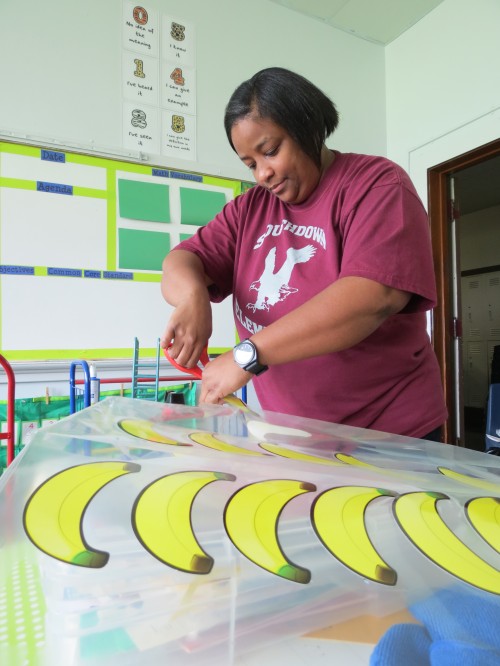
New school year brings new challenges locally
August 7, 2012
Doctors: Wright is fit for trial
August 7, 2012Nicholls State University will lay off 28 employees, including two faculty, again hampering the school’s student services as officials try to cope with the latest state funding cut, Nicholls announced last week.
The university has already notified those who will be laid off, President Stephen Hulbert said.
“This was an agonizing process, leaving good people jobless and introducing increased burdens to those left behind – the people who haven’t received a pay raise, unless they were promoted, since 2007,” Hulbert said in a printed statement.
The announcement came as the university finalized its 2012-13 operating budget at $52 million, about 6 percent less than last year and an 11 percent decline from 2010-11.
The tightened spending plan is largely due to a $4.4 million cut in the university’s state support, which brought the total cut in state funding to $17.9 million since 2008-09, a 50 percent decline.
The university is reporting an additional $900,000 reduction due to heightened state-mandated expenses – such as payments into the state retirement systems and insurance premiums – and a decline in enrollment.
In addition to the 28 layoffs, the university will eliminate 65 vacant positions, including 20 faculty slots. This brings the total employee reduction since 2008-09 to 122, including 33 instructors. It is a 12 percent decline in faculty and 18 percent reduction in staff over that time, university officials said.
The university also made cuts in operating and professional services, travel, supplies and library reference materials.
“It’s difficult to overstate the seriousness of these cuts, specifically to the cumulative effect of 10 reductions over the past four years,” Hulbert said. “The decimation of higher education in this state is unlike anything I have seen in my 40-plus years of professional experience.”
Nicholls is rapidly becoming more reliant on self-generated revenue – mainly tuition – as state budget woes have encumbered universities across Louisiana.
The primary way Nicholls is increasing revenue is through tuition hikes as authorized by the state Legislature through the Grad Act of 2010. The law gives universities leeway to raise tuition 10 percent each year as long as the schools meet accountability metrics, namely in terms of student graduation rates.
Full-time, undergraduate students residing in Louisiana paid $2,368 per semester in tuition and fees in 2011-12. Those same students will pay $2,839.60 per semester this school year and will eclipse $3,000 per semester in 2013-14.
Nicholls is merely a local example of a statewide issue. Funding to higher education across the state declined more than $100 million from 2011-12 to 2012-13. Almost half of that amount was delivered mid-year, when universities already worked from a finalized budget.
Roughly two-thirds of the state’s operating budget is protected from cuts due to constitutional or statutory edicts and dedications, federal mandates and other obligations. Higher education and health care are not protected, so the state’s lawmakers and administration look there often in times of fiscal stress.
To lessen the blow to higher education, the state Legislature infused the budget with roughly $265 million in non-recurring funds – such as revenue from the sale of state buildings. Because this money doesn’t have a consistent source, the budget crisis – and education and health care vulnerability – will return next year, said state Rep. Dee Richard.
“I have to believe higher ed in general is going to see more cuts,” Richard said. “The problem just keeps getting worse and worse until you face facts that you have to start prioritizing and protecting higher education and health care.”
The Thibodaux independent lawmaker identifies himself as one of the House’s “fiscal hawks,” who strongly opposed the use of one-time funds, to the dismay of some higher education leaders. He reiterated last week that setting a solid foundation for higher education and health care is more prudent than “kicking the can down the road.”
Richard said it is possible to cut extraneous and duplicated spending by eliminating unfilled state positions – which command an unrealized salary in the budget – and reducing the state’s consulting contracts by 10 percent. Richard filed bills for the previous two legislative sessions that would mandate these actions. Earlier this year, both bills passed the House and stalled in the Senate’s finance committee.
State Sen. Norby Chabert (R-Houma) is the committee’s vice chairman. He said the bills didn’t fail because of their mission, but because they “were too loosely written,” particularly the contracts bill, which didn’t pinpoint specific contracts.
“Just coming in and saying you need to cut consulting contracts without being specific is frivolous legislation,” Chabert said. “The Senate Finance Committee, the House Appropriations Committee, they spend one day a week at minimum working on the state budget during the session. We meet with (Joint Legislative Committee on the Budget) monthly. … Yet these folks who sit on the periphery come up with these out-of-the-box solutions, and none of them sit on budget committees.”
Chabert said that unless the state’s revenue rises and starts meeting projections – or some of the Constitutionally protected expenses are freed up – cuts to higher education support will continue to come down.
“I think (universities) face consistent struggles as long as state revenues are down,” Chabert said. “We’re not raising taxes on our citizens. We’re trying to do more with less.”
The state senator called on the community to support Nicholls by purchasing school gear, buying athletics season tickets and paying alumni dues.
“The community can offset a ton of things. … Off of every Nicholls’ apparel – every hat, every shirt, every beer mug – that is bought, Nicholls sees an 8 percent royalty revenue to the university for that.
“We need more people from this community that went to Nicholls walking around with Nicholls’ shirts on instead of LSU shirts on, and that will help. And that’s a small thing.”
The latest cut will not impact the curriculum Nicholls offers, but the scope in which they provide education will be clipped due to less faculty and class sections, officials have said. Nicholls has eliminated seven academic programs and four concentrations since 2008.
Larger class sizes also lessen individual teacher-student access, and less class sections will likely prevent some students from enrolling in particular classes during specific semesters.
“(The impact is) everywhere,” NSU Executive Vice President Larry Howell told the Tri-Parish Times when the cut was announced. “There’s not going to be an area that’s not affected some kind of way.”










